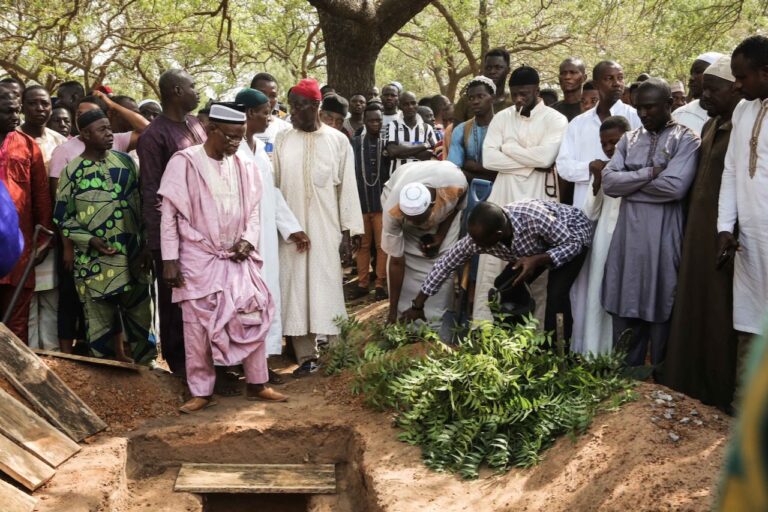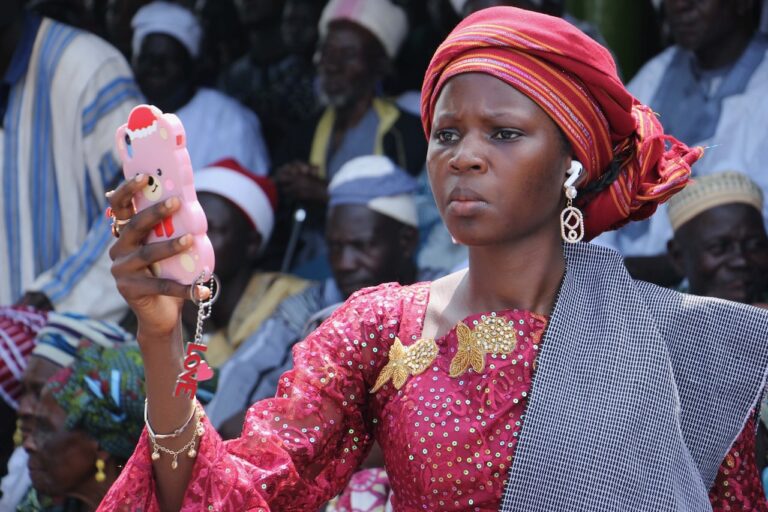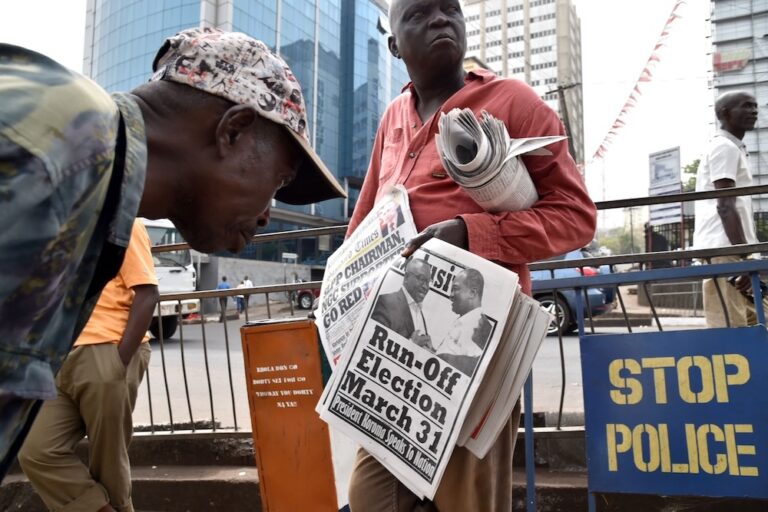July 2021 in Africa: A free expression round up produced by IFEX’s Regional Editor Reyhana Masters, based on IFEX member reports and news from the region. An audio discussion relating to this piece, and focusing on the deeply concerning Women in News sexual harassment report, is available here.
The month began with a historic crowning moment for The Gambia, when a five-year-long collaborative undertaking, between IFEX member the Gambia Press Union, civil society organisations, and the government culminated in the historic passing of the Access to Information Bill 2021 on 1 July.
In their analysis just under a decade ago, the African Platform on Access to Information (APAI) scored The Gambia 1 out of 10 (lowest score) in their assessment of the ATI environment. The APAI analysis reflected on the fact that: “In Gambia, you can rarely access the information you need, although if it is released, the information is only rarely released with restrictions or conditions on its use or publication.”
The push for ATI legislation in The Gambia is a story of persistence, determination and political will. Although the drive for ATI legislation began during Yahya Jammeh’s leadership, it took on greater impetus after President Adama Barrow came into power.
In 2016, the GPU along with the CSO Coalition on Freedom of Information – a consortium of more than a hundred civil society organisations, unions, and citizen groups – worked in partnership with the government through the Ministry of Justice. Named as one of TIME’s 100 Most Influential People 2020, Minister of Justice Abubacarr Tambadou eventually introduced the draft bill to the National Assembly in December 2019. In 2020, the GPU followed through with a vigorous nationwide public awareness campaign as part of its initiative to reinforce the Gambia’s consensus on ATI and media self-regulation.
Remarking on its adoption, GPU president Sheriff Bojang Jr. said “This is an indication that all the political parties and indeed every Gambian is in support of access to information, as it had been the missing piece in the Gambia’s quest to becoming a true democracy.”
Bonus ATI win in Ghana
An additional ATI win on the continent this month occurred when Ghana’s Right to Information Commission ordered the country’s Minerals Commission to grant Evans Aziamor-Mensah his information request at a cost of US$ .33 cents, and not the US$1,000 initially demanded.
Aziamor-Mensah is a reporter with The Fourth Estate, a non-profit, independent investigative journalism project established by IFEX member the Media Foundation for West Africa (MFWA), focusing on promoting transparency, accountability and anti-corruption in West Africa.
Although Article 21(1) (f) of the 1992 constitution explicitly guarantees that information generated by public institutions should be accessible to all citizens, Ghana only passed its RTI law in March 2019. Through its monitoring, MFWA discovered that despite the passage of the RTI law, awareness and uptake on the provisions remains rather low.
Late last year, MFWA sued the regulator – the National Communications Authority – after it demanded GHC2,000 (US$337) in order to grant a request for information on the radio stations it had shut down. The June 2021 ruling was a disappointment.
In line with its mandate to ensure the public easy access to information, MFWA encourages public institutions to keep their RTI request fees to a nominal rate so that all individuals, including those from marginalised and at-risk groups, can afford to pay for the requested information.
Sexual harassment survey
A survey of sexual harassment in eight African countries carried out by WAN-IFRA Women in News (WIN) together with the City University of London has revealed a shocking statistic: 1 in every 2 women working in the media sector has experienced some form of sexual harassment.
The research set out to collect credible information about the scale of harassment in news outlets in Africa and to establish what was being done to provide safer newsrooms. It surveyed 584 respondents from eight countries across the continent – Botswana, Kenya, Malawi, Rwanda, Uganda, Tanzania, Zambia, and Zimbabwe.
The survey revealed that the greatest barrier to those targeted coming forward is that the perpetrators are often managers or supervisors – people with more power. The research also found “an all-too-common narrative across the region’s newsrooms – and … found that 43 percent of gender non-conforming individuals and 19.5 percent of men had faced unwanted sexual attention.”
In a bid to make newsrooms safer, WIN will work with partners across the eight African countries to establish sexual harassment policies with clear reporting mechanisms.
Cameroonian transgender women released
The announcement of an early release for Cameroonian transgender women Shakiro (Njeuken Loic) and Patricai (Mouthe Roland) on 13 July was a welcome surprise. They were arrested on 8 February, while having dinner, for cross dressing, public indecency and failing to carry identification. Shakiro and Patricia were convicted of attempted homosexuality and sentenced to a five-year prison term.
The two women described the five months they spent in prison as hell.
Shakiro’s motherJosephine Njeukam told Reuters: “This day is the most beautiful day of my life because I did not believe that these children would make it out of prison with their health intact.”
Agba Jalingo granted compensation for torture
Nigeria’s deeply entrenched culture of impunity took a hit this month when the ECOWAS Community Court of Justice ordered the Nigerian government to pay journalist Agba Jalingo approximately USD73,000 in damages. The West African regional court granted the award as compensation “for the ill-treatment and torture of Jalingo while in detention in Cross River State.”
Amnesty International had listed Jalingo as a prisoner of conscience, and in 2019, as part of their International Day to End Impunity activities, the One Free Press Coalition ranked Jalingo’s detention as one of the Top 10 most urgent threats to press freedom globally.
Jalingo was arrested in August 2019 for treason – a charge which carries a life sentence – for an article he published on his Cross River Watch website and Facebook page accusing the Cross River Governor Benedict Ayade of misappropriating US$1.2 million intended for starting a bank. His arrest is also believed to have been in connection with his political links to another activist, Omoyele Sowore, who at the time was also in prison.
The trial was fraught with irregularities, including the use of anonymous witnesses. In December 2019, Justice Simon Amoeba of the High Court had to recuse himself from the case after an audio recording of him was leaked where he made biased remarks about Jalingo and his defence team.
Jalingo was finally released on a hefty bail of about US$24,000 in February 2020, after spending more than six months behind bars. His treason trial is still ongoing.
Ethiopia’s “Addis Standard” restricted overtly
Founded in 2011 by journalist Tsedale Lemma, the Addis Standard is one of a handful of women-headed media outlets on the African continent. It has risen to become a leading independent news magazine in a field dominated by politically affiliated or state run media. Throughout its decade-long existence, it has endured harassment and persecution from the different governments leading Ethiopia, especially during crises.
The most recent state action against the publication was the temporal suspension of its publisher Jakenn PLC by the Ethiopia Media Authority (EMA). By targeting the publisher, the state effectively halted operations of the English language monthly magazine and news website. After officials from EMA and management from Addis Standard met to discuss the issue, the publication was back online.
The EMA’s suspension of the Addis Standard and other media outlets came on the back of a restrictive order it gave to all publications not “to mischaracterize the country’s war-torn northern Tigray”. More specifically, local and foreign media were warned against referring to the Tigray People’s Liberation Front (TPLF) as a national army by calling it the Tigray Defense Force or TDF, and were warned there would be consequences for incorrectly framing the conflict by propping up the group, which the Ethiopian government officially classifies as a terrorist organisation.
The EMA claims it was acting on the complaints it received, accusing the Addis Standard of propelling the agenda of the TPLF in its reporting. However, the EMA did not follow due procedure in suspending the publication. The EMA has returned the publisher’s certificate of registration, allowing Addis Standard to resume operations, while investigating the complaints.
South Africa rocked by riots
Initially sparked by the incarceration of South Africa’s former President Jacob Zuma for contempt of court, deadly #FreeJacobZuma protests left a trail of destruction in parts of the country as businesses were looted and factories set on fire.
Zuma was given a 15-month prison sentence for contempt of court after he refused to appear before a Commission investigating corruption during his tenure as president from 2009-2018. Tensions were stoked when Zuma refused to comply with the order, but he eventually turned himself in to serve the sentence. Riots resumed soon after, in mid-July.
The media was caught up in the melée, with journalists first being threatened by Zuma’s family and supporters. As the political standoff remained unresolved, threats turned into physical attacks, with numerous incidents reported around the country. An SABC news crew was robbed at gunpoint, and another broadcaster, Newzroom Afrika, had its vehicle damaged in the protests. Four community radio stations – Alex FM, Mams Radio, West Side FM in Gauteng province and Intokozo FM in Kwa-Zulu Natal province – went off-air after looters stole broadcasting equipment.
Individual broadcasters and other members of the industry through the National Broadcasters Association stepped up to assist the affected radio stations get back on-air within days of the attacks.
In Brief
After receiving threatening messages via Facebook Messenger, Liberian journalist Aryee Davis sought protection from IFEX member the Center for Media Studies and Peacebuilding (CEMESP). The messages come from supporters of Alex Grant, a member of Liberia’s House of Representatives, after she reported that the legislator had falsified his academic qualifications. The Coalition For Women In Journalism (CFWIJ) has demanded that cybersecurity authorities immediately address the threats against Davis and all other women in online spaces.
Expressing their outrage and dismay, the MFWA believe the killing of Ghanaian social activist Ibrahim Anyass Muhammed Kaaka could cement a ‘culture of silence’ that discourages citizens on speaking out on social development issues.
Like several other countries on the continent, Angolan authorities are also turning to criminal defamation clauses in the Penal Code to turn up the heat on journalists. Two more journalists charged in separate incidents, Coque Mukuta and Escrivão José, face up to 18 months in prison if found guilty of criminal defamation in their respective cases.
Zambians will go to the polls on 12 August against a backdrop of shrinking civic space and repression. In its latest report: Zambia: Ruling By Fear and Repression, Amnesty International highlights the marked deterioration of Zambia’s human rights landscape. “People have increasingly been unable to freely assemble publicly, engage in public demonstrations or protest against government actions without being subjected to intimidation and harassment by the police. Fearful of reprisals, many people and the media have resorted to silence and self-censorship.
In next month’s IFEX Africa regional round up, we will take a more in-depth look at the pre and post electoral landscape in the country.
New and Noteworthy
The 2021 Index on Censorship Freedom of Expression Awards shortlist includes Djibouti journalist Kadar Abdi Ibrahim and Niger journalist Samira Sabou. The awards celebrate individuals or groups who have made a significant impact fighting censorship. The winners will be announced at the annual Freedom of Expression Awards Gala on 12 September 2021.
Seven activists fighting to improve LGBTQI+ rights across Africa are featured in a Vogue piece by poet and journalist, Nigerian femme queer Ugonna-Ora Owoh, whose works have appeared in several publications that include The Independent, Stylist Magazine, and OkayAfrica.
Catherine E McKinley’s The African Lookbook: A Visual History of 100 Years of African Women is what she calls “a story of inheritance”. Al Jazeera describes it as: “the previously unexamined role of the photos’ female subjects, and along with it, the story of the cloth they wore and the sewing machines that turned it into fashion. To the women, and particularly the sitters in the photos, the cloth was a means of telling a story about themselves: the print, the dye, how they wrapped it, wore it, and had it cut and sewn.”
If you enjoyed reading this piece, check out our August 2021 edition of Africa Brief, in which IFEX’s Nazarene Njeru & Reyhana Masters discuss the deeply concerning findings of the recent Women in News report on sexual harassment in African media organisations. They also report on progress in Nigeria’s fight against impunity, and discuss Zambia’s election, which was taking place as we recorded.



